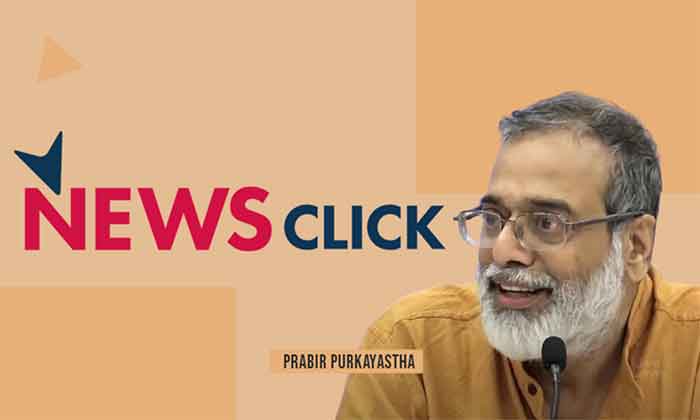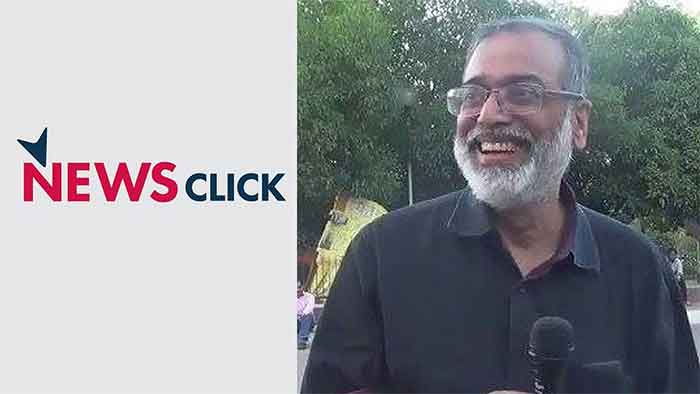Letter sent to President Lula in the second week of March, signed by representatives of the eight Brazilian organisations that created the World Social Forum in January 2001. The worldwide campaign in defence of Prabir’s freedom joins the campaign for Assange’s release and will have a new letter to the UN Secretary General, António Guterres.

Dear President Lula,
Writing to you are old comrades. We are members of the group that created the World Social Forum and helped to spread it around the world. We are reaching out to communicate a grave matter and to request your support. The Indian journalist Prabir Purkayastha, one of the organizers of the World Social Forum in India in 2004, is currently imprisoned at the age of 78. He has been incarcerated for three months by the regime of Prime Minister Narendra Modi. This imprisonment is political in nature. It aims to silence Newsclick, a democratic publication supportive of social movements, created and led by Prabir. It is based on an ultra-authoritarian law, previously declared as an attack on the Universal Declaration of Human Rights by UN rapporteurs. As India, along with Brazil, is present in the BRICS, we believe that you can contribute to rectifying this injustice and this assault on political freedoms.
You will recognize, President, similarities between Prabir’s imprisonment and your own arbitrary and infamous incarceration. The detention order is based on a trivial fact: a newspaper article. On August 5th of last year, The New York Times published a piece about an alleged international media network that supported China. It was said to be sponsored by an American millionaire, Neville Roy Singhan – who had become wealthy during the internet platform boom and allegedly decided to support publications with editorial positions favorable to Beijing. Notice the hypocrisy, President. Media outlets favorable to large economic groups receive floods of money all the time, from local and international companies interested in maintaining the status quo. Yet they produce fake “reports” to complain that a single wealthy man supposedly decided to strengthen those who think differently.
Prabir’s imprisonment was initially supposed to last for 6 days, but it has been extended since October 3rd and may continue indefinitely. In August 2014, the Indian Congress approved an amendment to the Unlawful Activities Prevention Act (UAPA) in a summary manner (24 days of processing in both legislative houses). Established since 1963, it was completely disfigured. The new text allows the government to designate groups or individuals as “terrorism suspects”. The “evidence” can be as fragile as that which victimized Prabir. But citizens identified as suspects are kept in custody for the duration of the “investigations”.
The “preventive” detentions are being extended until they turn into sentences without trial. Data from the Indian government itself pointed out, in 2022, the mass political imprisonment resulting from this provision. In four years, 24,134 people had been arrested under the UAPA. Of these, only 589 were brought to trial (386 of whom were acquitted). 23,545 remained imprisoned – or 97.5% of the total…
The law also authorizes the confiscation of the assets of the individuals under investigation – which has already occurred with the publication led by Prabir, Newsclick. On the eve of Christmas 2023, the newspaper’s bank accounts were frozen. Salaries and other commitments have not been paid since then. The suffocation attempt is evident.
The Indian government wants to punish Prabir for his success. Founded in 2009, Newsclick has achieved great audience and impact. It produced compelling news and analyses about events in India and the world, advocating a clearly anti-neoliberal interpretation. It also allied itself with significant social movements, such as the major national farmers’ protest of 2020-2021. This struggle resulted in the harshest defeat suffered by Modi in ten years of office, forcing him to abandon a set of counter-reforms that threatened peasant production and handed over the countryside to corporations.
Prabir’s trajectory has been marked, for over 50 years, by social struggles and the desire to build a fairer world. You will remember, President, a significant event in which he was involved. In December 1984, then young engineers, Prabir and a colleague, reported to the world the tragedy of Bhopal. As founders, in 1978, of the Delhi Science Forum, they were called upon to investigate the disaster at an old Union Carbide warehouse, where pesticides were produced. The negligence of the American multinational had favored, they found, the leakage of a highly lethal substance – methyl isocyanate. The shadow of death spread over the city. About 20 thousand people were poisoned and died in the following hours and days. Another 600 thousand still suffer from the consequences.
Prabir graduated in Engineering from the universities of Calcutta and Allahabad. He joined the Communist Party of India in 1970. In 1975, he enrolled in the School of Computing and Systems Science at Jawaharlal Nehru University. He worked in the information technology and energy sectors for over 40 years and served on Indian government committees related to these issues. In “Keeping up the good fight,” an autobiographical book released weeks ago, already with the author imprisoned, he writes: “I discovered that I had three ‘passions,’ and that I would always live with them: Science, Technology, and, of course, Politics. Only over time did it become clear how they would combine in the following decades.”
His passions combined in Prabir’s relentless fight to free knowledge from the mercantile barriers that limit its circulation. Among other initiatives, he articulated in India the international Knowledge Commons movement, which proposes alternatives to the concept and mechanisms of “intellectual property,” and the Free Software Foundation.
Imprisoned shortly before becoming an octogenarian, Prabir does not give up. He refuses the victim status. In his memoirs, he explains: “Victimization robs us of the role of participants in creating history. It reduces us to mere objects. Instead, I would like to take on the perspective of the people who make history. Yes, the current governments wield powers that seem to belittle individuals and their organizations. But it is the people and their actions that ultimately determine History; not as much as we would like or how, but in ways that neither the people nor their rulers can anticipate.”
And he concludes, with subtle irony: “I am as old as the Indian republic. In my life of over 75 years, I have learned a thing or two – maybe even three. I have learned how I can be a part of my country, rich and diverse, and at the same time a part of an even larger, more complex, and fascinating world. All I need to do is fight for a better world for all.”
This human being, Prabir Pukayastha, needs to be free, President Lula. A word from you to Narendra Modi can make a difference.
Antonio Martins
Cândido Grzybowski
Chico Whitaker
João Pedro Stedile
Maria Luísa Mendonça
Oded Grajew
Sérgio Haddad
Originally published in Pressenza














































